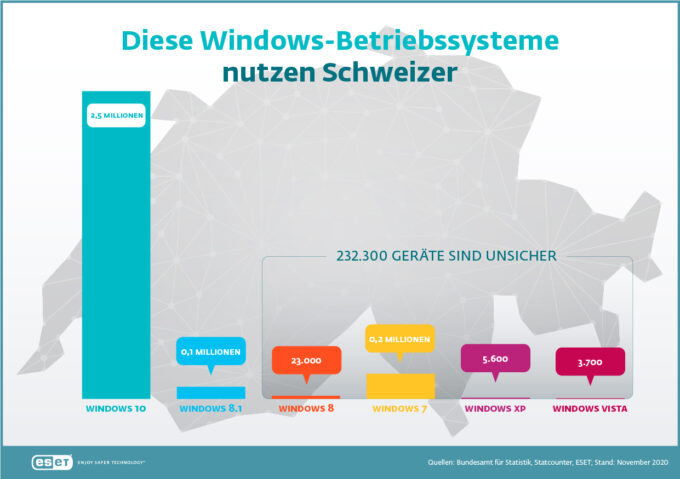Switzerland: Around 10% outdated operating systems in use
Windows operating systems have a market share of around 70 percent for desktop PCs and notebooks in Switzerland. The majority of devices use the latest Windows 10, but a closer look at the figures reveals a very worrying security situation: 232,000 devices rely on outdated Windows versions.

On 200,000 computers alone, Windows 7 is still installed, although support for the operating system from Microsoft ended just over a year ago. And more than 30,000 PCs are running Windows 8, XP or Vista. Operating systems that have not been updated for years, as Eset writes.
The vast majority (2.5 million) of desktop PCs and notebooks in Switzerland are running the current Windows 10. Around 100,000 devices continue to use 8.1, which will still receive security updates until 2023. Although it was possible to switch to Windows 10 from old versions free of charge, around 10 percent of Windows users still have an outdated system installed, according to Eset, which specializes in cyber security.
Risk is underestimated
Detected security vulnerabilities for the above-mentioned Windows versions would no longer be closed by Microsoft updates and could be exploited by cybercriminals. In particular, the operating system used is an important pillar for ensuring the security of the device and the entire network. "Many users underestimate the security risk of an outdated Windows version. One vulnerability is enough and the computers are open like a barn door for cyber criminals," explains Thomas Uhlemann, security specialist at Eset. "This behavior is negligent. Information about known security holes spreads rapidly in underground forums and is used for a variety of attack scenarios." Extremely problematic can be the use of operating system dinosaurs in the event of a claim. "For companies, the use can become very expensive as soon as personal data is processed on these devices, because the General Data Protection Regulation clearly requires compliance with the state of the art in this case. Likewise, regulations by cyber insurers or financial service providers may be invalidated in the event of a claim."
Negligence in the case of damage caused by online banking
The fact that the access data for online banking as well as the TAN number should not be disclosed to third parties is well known to many users. However, a modern operating system that is always kept up to date is just as much a part of due diligence as the use of a modern security solution or an up-to-date browser. In the event of damage, banks can refuse a claim for compensation because the customer has negligently neglected his duties. In many cases, cyber insurance companies also refuse to settle claims here. Users should regularly check the computer they use for online banking for updates, advises Eset.
The security experts at Eset offer the following tips:
Update Windows: Even if the change is difficult at first, the latest Windows version should always be used. Users who still rely on old versions such as 7 or XP should switch as soon as possible. ESET recommends that users switch to Windows 10, but a Linux distribution can also be a good alternative.
Always be up to date: The operating system, the hardware and the installed software should always be up-to-date. Users should install updates immediately. It is recommended to activate the automatic update function, if available.
Deploy security software: Modern Internet security software is mandatory. In addition to emails and websites, the security solution must also check removable media such as USB sticks, the network interfaces and the RAM for malware. The solution should also have an exploit blocker that provides reliable protection in an emergency if no update is yet available for the software in question.
Source: Eset









